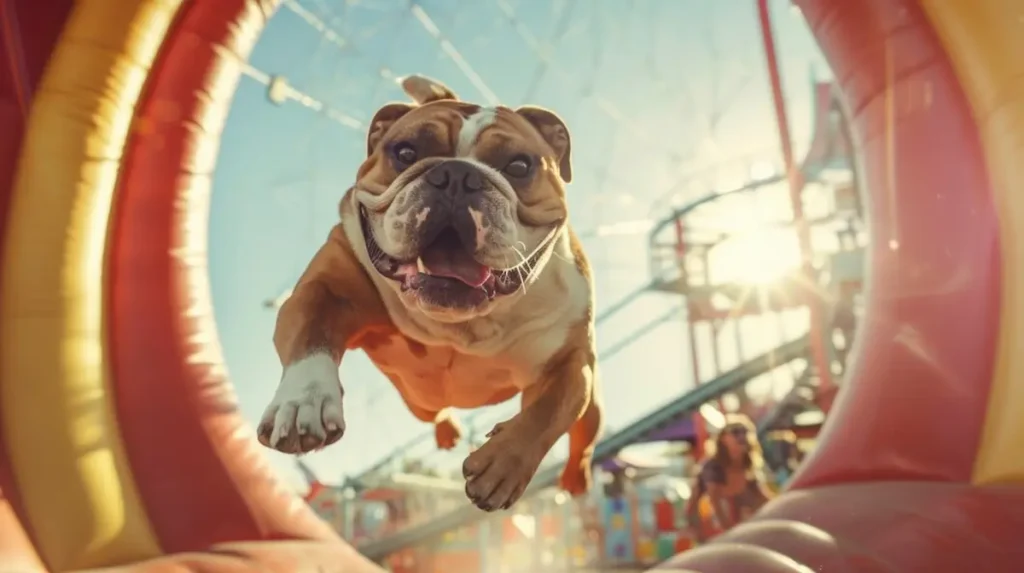Everything You Need to Know About English Bulldog Behavior: Training, Health, and More!
Ever wondered why your English Bulldog behaves a certain way? Bulldogs are known for their distinct personality traits, from their loyal nature to their infamous stubbornness. To fully enjoy life with an English Bulldog, it’s crucial to understand their unique behaviors and how to navigate them. After all, these dogs are not only unique in appearance but also in personality.
Why Is It Important to Understand Bulldog Behavior?

Understanding English Bulldog behavior is crucial for any owner. Knowing your dog’s actions and needs helps you build a strong, healthy relationship with them and avoid unwanted situations such as behavioral problems or misunderstandings between you and your dog. Dogs that have their behavior understood are easier to train and exhibit more stable behavior. Moreover, this understanding helps you meet your dog’s needs better, whether in terms of training, healthcare, or providing them with a comfortable environment.
How Bulldog Behavior Differs from Other Breeds
The English Bulldog displays unique behavioral traits that set it apart from other breeds. For example, English Bulldogs tend to be calmer and more independent compared to other breeds like Beagles or German Shepherds. They are known to be less active and prefer relaxing at home over running in parks. Additionally, they are often more loyal to their owners and less interested in strangers. This reflects different training and interaction needs compared to other breeds.
Related: King Shepherds: The Ultimate Guide to Their Care, Training, and Health
Physical Characteristics and How They Influence Behavior
The Unique Build of the English Bulldog
With a broad body, muscular frame, and distinctive wrinkled face, the English Bulldog stands out. However, their build isn’t just for show. This compact frame often means lower stamina and certain physical limitations, which can lead to behaviors like quick tiring and love for lounging.
Health Challenges and Behavioral Impact
Health challenges are common in Bulldogs, especially respiratory issues. These can sometimes make them seem lethargic or disinterested in long play sessions, as their bodies need more breaks. Recognizing these limits helps ensure they stay comfortable while enjoying play.
The Bulldog’s Personality and Temperament

Friendly Yet Protective: The Bulldog’s Loyalty
English Bulldogs are known for their fierce loyalty to family members. They’re typically friendly, but that doesn’t mean they aren’t protective, especially when they sense their loved ones might be in danger.
Calm Yet Stubborn: The Independent Streak
Bulldogs are calm, almost to the point of appearing lazy, but they also have an independent streak. This can make them a little challenging for first-time owners, especially in situations where training and direction are required.
English Bulldog Social Behavior
Bulldog Behavior with Family Members
Bulldogs form strong bonds with their families, thriving on companionship and affection. Their behavior around family members is often calm and affectionate, with a tendency to stick close to their people.
Bulldog Interaction with Strangers and Other Pets
Generally, English Bulldogs are sociable with other dogs and people. Early socialization helps them develop a balanced attitude toward new faces, reducing the risk of aggression or anxiety in social settings.
Related: How to Potty Training an Adult Dog Fast: Effective Techniques for Success
Common Behavioral Traits of the English Bulldog
Stubbornness and How to Handle It
Bulldogs are known for their stubborn behavior, which can sometimes make training challenging. They often have a “selective listening” trait, where they may seem to ignore commands they’re not interested in.
Playfulness and Affectionate Nature
Though calm, Bulldogs love attention and playtime in short bursts. They thrive on affection from their families and often show their playful side when they feel comfortable and secure.
Bulldogs’ Tendency to Be Couch Potatoes
Most Bulldogs are quite content to lounge around, which makes them ideal for families who prefer a quieter pet. However, this also means they’re prone to weight gain if not encouraged to engage in physical activities.
Addressing Bulldog Health and Its Influence on Behavior
How Breathing Issues Can Affect Activity Levels
Due to their short snouts, Bulldogs can face breathing challenges that impact their energy and endurance. This can result in them preferring shorter play sessions and frequent rest periods.
Joint and Hip Issues: Impact on Daily Behavior
Hip and joint problems are common among Bulldogs, and they can influence a Bulldog’s mobility and willingness to engage in physical activities. Managing these issues with proper care helps improve their comfort and activity levels.
Training Your English Bulldog

Why Bulldogs Are Notoriously Difficult to Train
Bulldogs’ stubborn nature makes them one of the more challenging breeds to train. They often resist new commands or changes, which requires patience from their owners.
Best Techniques for Training a Bulldog
Using positive reinforcement is key. Rewarding them with treats, praise, or playtime can motivate Bulldogs, as they respond better to encouragement than forceful techniques.
The Importance of Positive Reinforcement
Positive reinforcement builds trust between you and your Bulldog, making them more receptive to training. It also reduces stress, helping Bulldogs maintain a balanced behavior.
Exercise Needs for English Bulldogs
How Much Exercise Is Ideal?
Bulldogs don’t need extensive exercise but benefit from short daily walks and brief play sessions. Over-exercising can strain them, so it’s best to keep activities moderate.
Exercise Tips to Keep Bulldogs Healthy and Happy
Engage them in low-impact exercises that suit their build and stamina, like slow-paced walks or gentle indoor play. Consistent, mild activity helps manage their weight and prevents boredom.
Socializing Your Bulldog for a Balanced Personality
Benefits of Early Socialization
Early socialization introduces Bulldogs to various sights, sounds, and experiences, which helps them become more adaptable and less anxious in new situations.
Overcoming Social Challenges in Bulldogs
Some Bulldogs may be cautious around new people or animals. With gradual exposure and patience, they can learn to socialize effectively without feeling overwhelmed.
Handling Common Behavioral Issues in Bulldogs
Dealing with Bulldog Stubbornness
When Bulldogs show stubborn behavior, consistency is crucial. Reinforcing commands and maintaining a routine help them learn what’s expected.
Reducing Bulldog Anxiety and Stress
Bulldogs can be prone to anxiety, especially when left alone. Creating a comforting environment and using interactive toys can help alleviate their stress.
Maintaining a Strong Bond with Your Bulldog
Ways to Build Trust with Your Bulldog
Building trust with a Bulldog involves patience, kindness, and consistent care. Regular attention and affection strengthen your bond with them.
Tips for a Happy, Healthy Bulldog-Owner Relationship
Providing a stable routine, showing affection, and respecting their physical limits lead to a happy Bulldog-owner relationship.
Conclusion
Understanding English Bulldog behavior is essential for any owner. From their health challenges and temperament to their unique personality quirks, Bulldogs bring a distinct charm to the home. By learning about their behaviors and needs, owners can foster a strong, positive bond with their Bulldogs, making life with this loyal companion even more enjoyable.
FAQs
- Are English Bulldogs good with children?
Yes, they are typically gentle and great with kids, and they are known for their protective nature. - How can I manage my Bulldog’s stubbornness?
Consistent training with positive reinforcement can help address Bulldog stubbornness. - What kind of training works best for Bulldogs?
Positive reinforcement is most effective, such as using rewards like treats and praise. - Do Bulldogs need a lot of exercise?
No, they need moderate, low-impact exercise to stay healthy without straining. - How do I socialize with my English Bulldog?
Early socialization through gradual exposure helps Bulldogs adapt to new experiences. - Are Bulldogs aggressive with other dogs?
Bulldogs are typically friendly but may need gradual introductions to new dogs. - What is the best way to reduce stress in Bulldogs?
Provide a stable routine, companionship, and engaging toys to reduce Bulldog stress.





